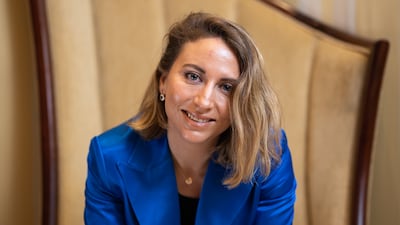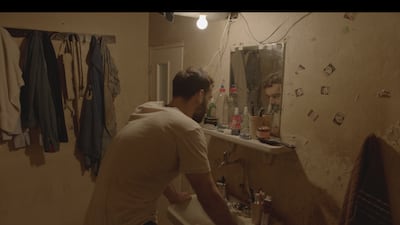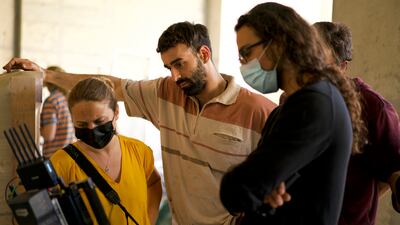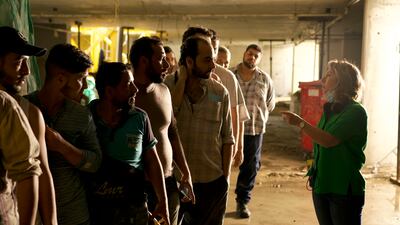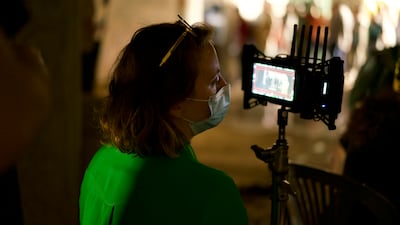When writer and director Dania Bdeir was 16, her father gave her a video camera. It was a defining moment for Bdeir, who had aspirations to be an actress before finding herself more creatively challenged behind the lens.
Soon after, Bdeir started filming everything and taught herself to edit, beginning her professional journey in creative storytelling.
It was only towards the end of her father’s life, however, that Bdeir found out that he, like her, was a creative too. Her father was a photographer in his university days in San Francisco, living a creative freedom that was cut short after he graduated and returned home to Lebanon and worked in the family export and import business.
It’s an irony not lost on Bdeir, whose film, Warsha, is one of 15 short films shortlisted nominated for the 95th Academy Awards.
Warsha is an intense, beautifully shot film that explores masculinity and societal expectations through the perspective of a Syrian migrant working as crane operator in Beirut.
Profound, layered and moving, Warsha takes audiences on a masterfully plotted journey, with nuanced takes on its central theme ― freedom.
The story follows Mohammad, who, while living with other Syrian migrants working on a construction site, volunteers for the extremely dangerous job of crane operator. As he climbs up to his new position, away from the eyes of his peers and the sounds of the city, he is, for a few moments, able to live as an unchained and free version of himself.
The seed of the story came to Bdeir when, in 2017, she saw from her apartment balcony overlooking Beirut, a man standing on the top of the cabin of the tallest construction crane, praying. The sight left an indelible mark on her and unleashed an obsession with crane operators and their experiences.
“I had this first scene that was stuck in my head, this idea of this man climbing a ladder,” Bdeir tells The National.
“Progressively the sounds of the city disappear and he reaches this place, this bubble and cocoon of silence and calm overlooking the whole city where he can see the world but nobody can see him.”
Warsha is an unexpected and intimate character portrait that flawlessly fuses many opposing elements. The intense sound of the city with music, small and open spaces, fear and liberty, dull shadows and overpowering light and colour. From its aesthetics, themes and references, Bdeir has woven a story of breathtaking scope and layers in a short amount of time.
Before writing the script for Warsha, Bdeir spent time on construction sites. She observed and researched how they operated, how the construction workers lived and interacted with one another and the outside world.
It was a world dominated by the sounds of machinery and an intense, hyper-masculine energy.
“I noticed in Lebanon, that [construction[ workers were almost always undocumented, underpaid Syrian workers,” she says.
“So they tended to try and move as a group and call the least attention to themselves as possible.”
Due to the war in Syria, Lebanon has experienced an influx of refugees over the years. Their presence has been blamed for causing a strain on the weak economic infrastructure of the country, resulting in a tense relationship between Syrian construction workers and the Lebanese people, Bdeir says.
This palpable frustration, fear and a brimming fury throughout the city is translated into the film in small and powerful details.
Despite not having a fully fleshed-out story, Bdeir had “feelings and sensations and emotions” that she wanted to explore.
The story started to take form when she saw the work of Khansa, a contemporary Arab pop singer, dancer and actor.
His single and music video Khayif was going viral and explored ideas around conforming to society's expectation of masculinity and stifling creative freedom. Bdeir then saw him performing live, describing it as “beyond singing, beyond dancing” and “a shared experience of the audience”.
Upon approaching Khansa with the idea of collaborating on the film, Bdeir quickly knew that he would play her main character, Mohammad.
Khansa’s silent performance in the film is incredibly personal and poignant. Every gesture, movement and expression is rooted in reality but feels like choreographed storytelling gestures.
“It's not just a director who's casting an actor,” Khansa says of his collaboration with Bdeir.
“It's a storyteller working with an artist to create that universe where this storyteller bridges between the character they want to bring to life, and the artist who finds himself within this character.”
For his part, Khansa immersed himself in research to understand the world Mohammad comes from. As a performing artist who plays with ideas of masculinity and femininity in his music and dance, Khansa initially felt well versed in the space his character occupied.
“The character was challenging, because I have to be myself but in a parallel world,” he says. “I started by just watching, observing my movement, observing other people's movement, watching how different people behave.”
Khansa committed to his research by working on a construction site in Beirut. He walked on to it, not as an artist doing research but as a completely committed worker.
“I met Syrian construction site workers, I lived with them practically,” he says.
“I experienced all the different chores they do. I worked with them. I was also focusing on the concept of identity and privacy and something that everybody relates to through movement, because dance is a universal language.”
Since Warsha’s release at the Sundance Film Festival on January 20 last year, it has been screened at more than 200 festivals in more than 60 countries and has won more than 90 awards. These include the Short Film Jury Award for International Fiction at Sundance, the Best Fiction award at Tampere Film Festival in Finland and the Jury Prize of the Festival at the Regard Festival international du court metrage au Saguenay in Canada.
“It's been very interesting to go to different countries around the world and see what are the things that are touching people on a deep level,” Bdeir says.
“My Mena premiere was in Saudi Arabia and I think it struck a very specific chord there that was very beautiful to see.”
The critical success of Warsha on the film festival circuit reveals that Bdeir’s work and her collaboration with Khansa has touched viewers across cultures and languages, communicating something universal.
“What I was trying to get to [with the script] is make it very specific and very unique,” Bdeir says.
“This is the experience of a migrant worker in Lebanon at this time, with the political and social and economic climate which would make it feel rooted in the space. But at the same time going back to what is the emotional story, which is what connected people and made it universal.”
UAE currency: the story behind the money in your pockets
How much do leading UAE’s UK curriculum schools charge for Year 6?
- Nord Anglia International School (Dubai) – Dh85,032
- Kings School Al Barsha (Dubai) – Dh71,905
- Brighton College Abu Dhabi - Dh68,560
- Jumeirah English Speaking School (Dubai) – Dh59,728
- Gems Wellington International School – Dubai Branch – Dh58,488
- The British School Al Khubairat (Abu Dhabi) - Dh54,170
- Dubai English Speaking School – Dh51,269
*Annual tuition fees covering the 2024/2025 academic year
Ain Dubai in numbers
126: The length in metres of the legs supporting the structure
1 football pitch: The length of each permanent spoke is longer than a professional soccer pitch
16 A380 Airbuses: The equivalent weight of the wheel rim.
9,000 tonnes: The amount of steel used to construct the project.
5 tonnes: The weight of each permanent spoke that is holding the wheel rim in place
192: The amount of cable wires used to create the wheel. They measure a distance of 2,4000km in total, the equivalent of the distance between Dubai and Cairo.
Multitasking pays off for money goals
Tackling money goals one at a time cost financial literacy expert Barbara O'Neill at least $1 million.
That's how much Ms O'Neill, a distinguished professor at Rutgers University in the US, figures she lost by starting saving for retirement only after she had created an emergency fund, bought a car with cash and purchased a home.
"I tell students that eventually, 30 years later, I hit the million-dollar mark, but I could've had $2 million," Ms O'Neill says.
Too often, financial experts say, people want to attack their money goals one at a time: "As soon as I pay off my credit card debt, then I'll start saving for a home," or, "As soon as I pay off my student loan debt, then I'll start saving for retirement"."
People do not realise how costly the words "as soon as" can be. Paying off debt is a worthy goal, but it should not come at the expense of other goals, particularly saving for retirement. The sooner money is contributed, the longer it can benefit from compounded returns. Compounded returns are when your investment gains earn their own gains, which can dramatically increase your balances over time.
"By putting off saving for the future, you are really inhibiting yourself from benefiting from that wonderful magic," says Kimberly Zimmerman Rand , an accredited financial counsellor and principal at Dragonfly Financial Solutions in Boston. "If you can start saving today ... you are going to have a lot more five years from now than if you decide to pay off debt for three years and start saving in year four."
Lexus LX700h specs
Engine: 3.4-litre twin-turbo V6 plus supplementary electric motor
Power: 464hp at 5,200rpm
Torque: 790Nm from 2,000-3,600rpm
Transmission: 10-speed auto
Fuel consumption: 11.7L/100km
On sale: Now
Price: From Dh590,000
yallacompare profile
Date of launch: 2014
Founder: Jon Richards, founder and chief executive; Samer Chebab, co-founder and chief operating officer, and Jonathan Rawlings, co-founder and chief financial officer
Based: Media City, Dubai
Sector: Financial services
Size: 120 employees
Investors: 2014: $500,000 in a seed round led by Mulverhill Associates; 2015: $3m in Series A funding led by STC Ventures (managed by Iris Capital), Wamda and Dubai Silicon Oasis Authority; 2019: $8m in Series B funding with the same investors as Series A along with Precinct Partners, Saned and Argo Ventures (the VC arm of multinational insurer Argo Group)
What sanctions would be reimposed?
Under ‘snapback’, measures imposed on Iran by the UN Security Council in six resolutions would be restored, including:
- An arms embargo
- A ban on uranium enrichment and reprocessing
- A ban on launches and other activities with ballistic missiles capable of delivering nuclear weapons, as well as ballistic missile technology transfer and technical assistance
- A targeted global asset freeze and travel ban on Iranian individuals and entities
- Authorisation for countries to inspect Iran Air Cargo and Islamic Republic of Iran Shipping Lines cargoes for banned goods
2.0
Director: S Shankar
Producer: Lyca Productions; presented by Dharma Films
Cast: Rajnikanth, Akshay Kumar, Amy Jackson, Sudhanshu Pandey
Rating: 3.5/5 stars
BMW M5 specs
Engine: 4.4-litre twin-turbo V-8 petrol enging with additional electric motor
Power: 727hp
Torque: 1,000Nm
Transmission: 8-speed auto
Fuel consumption: 10.6L/100km
On sale: Now
Price: From Dh650,000
The specs
AT4 Ultimate, as tested
Engine: 6.2-litre V8
Power: 420hp
Torque: 623Nm
Transmission: 10-speed automatic
Price: From Dh330,800 (Elevation: Dh236,400; AT4: Dh286,800; Denali: Dh345,800)
On sale: Now
Key facilities
- Olympic-size swimming pool with a split bulkhead for multi-use configurations, including water polo and 50m/25m training lanes
- Premier League-standard football pitch
- 400m Olympic running track
- NBA-spec basketball court with auditorium
- 600-seat auditorium
- Spaces for historical and cultural exploration
- An elevated football field that doubles as a helipad
- Specialist robotics and science laboratories
- AR and VR-enabled learning centres
- Disruption Lab and Research Centre for developing entrepreneurial skills
THE%20SWIMMERS
%3Cp%3E%3Cstrong%3EDirector%3A%20%3C%2Fstrong%3ESally%20El-Hosaini%3C%2Fp%3E%0A%3Cp%3E%3Cstrong%3EStars%3A%20%3C%2Fstrong%3ENathalie%20Issa%2C%20Manal%20Issa%2C%20Ahmed%20Malek%20and%20Ali%20Suliman%C2%A0%3C%2Fp%3E%0A%3Cp%3E%3Cstrong%3ERating%3A%20%3C%2Fstrong%3E4%2F5%3C%2Fp%3E%0A
What is dialysis?
Dialysis is a way of cleaning your blood when your kidneys fail and can no longer do the job.
It gets rid of your body's wastes, extra salt and water, and helps to control your blood pressure. The main cause of kidney failure is diabetes and hypertension.
There are two kinds of dialysis — haemodialysis and peritoneal.
In haemodialysis, blood is pumped out of your body to an artificial kidney machine that filter your blood and returns it to your body by tubes.
In peritoneal dialysis, the inside lining of your own belly acts as a natural filter. Wastes are taken out by means of a cleansing fluid which is washed in and out of your belly in cycles.
It isn’t an option for everyone but if eligible, can be done at home by the patient or caregiver. This, as opposed to home haemodialysis, is covered by insurance in the UAE.
If you go
Flight connections to Ulaanbaatar are available through a variety of hubs, including Seoul and Beijing, with airlines including Mongolian Airlines and Korean Air. While some nationalities, such as Americans, don’t need a tourist visa for Mongolia, others, including UAE citizens, can obtain a visa on arrival, while others including UK citizens, need to obtain a visa in advance. Contact the Mongolian Embassy in the UAE for more information.
Nomadic Road offers expedition-style trips to Mongolia in January and August, and other destinations during most other months. Its nine-day August 2020 Mongolia trip will cost from $5,250 per person based on two sharing, including airport transfers, two nights’ hotel accommodation in Ulaanbaatar, vehicle rental, fuel, third party vehicle liability insurance, the services of a guide and support team, accommodation, food and entrance fees; nomadicroad.com
A fully guided three-day, two-night itinerary at Three Camel Lodge costs from $2,420 per person based on two sharing, including airport transfers, accommodation, meals and excursions including the Yol Valley and Flaming Cliffs. A return internal flight from Ulaanbaatar to Dalanzadgad costs $300 per person and the flight takes 90 minutes each way; threecamellodge.com
UAE currency: the story behind the money in your pockets
The specs
- Engine: 3.9-litre twin-turbo V8
- Power: 640hp
- Torque: 760nm
- On sale: 2026
- Price: Not announced yet
UEFA CHAMPIONS LEAGUE FIXTURES
All kick-off times 10.45pm UAE ( 4 GMT) unless stated
Tuesday
Sevilla v Maribor
Spartak Moscow v Liverpool
Manchester City v Shakhtar Donetsk
Napoli v Feyenoord
Besiktas v RB Leipzig
Monaco v Porto
Apoel Nicosia v Tottenham Hotspur
Borussia Dortmund v Real Madrid
Wednesday
Basel v Benfica
CSKA Moscow Manchester United
Paris Saint-Germain v Bayern Munich
Anderlecht v Celtic
Qarabag v Roma (8pm)
Atletico Madrid v Chelsea
Juventus v Olympiakos
Sporting Lisbon v Barcelona
FIXTURES
All times UAE ( 4 GMT)
Friday
Saint-Etienne v Montpellier (10.45pm)
Saturday
Monaco v Caen (7pm)
Amiens v Bordeaux (10pm)
Angers v Toulouse (10pm)
Metz v Dijon (10pm)
Nantes v Guingamp (10pm)
Rennes v Lille (10pm)
Sunday
Nice v Strasbourg (5pm)
Troyes v Lyon (7pm)
Marseille v Paris Saint-Germain (11pm)
Cryopreservation: A timeline
- Keyhole surgery under general anaesthetic
- Ovarian tissue surgically removed
- Tissue processed in a high-tech facility
- Tissue re-implanted at a time of the patient’s choosing
- Full hormone production regained within 4-6 months
Dhadak 2
Director: Shazia Iqbal
Starring: Siddhant Chaturvedi, Triptii Dimri
Rating: 1/5
GAC GS8 Specs
Engine: 2.0-litre 4cyl turbo
Power: 248hp at 5,200rpm
Torque: 400Nm at 1,750-4,000rpm
Transmission: 8-speed auto
Fuel consumption: 9.1L/100km
On sale: Now
Price: From Dh149,900
The specs
Engine: 4.0-litre flat-six
Torque: 450Nm at 6,100rpm
Transmission: 7-speed PDK auto or 6-speed manual
Fuel economy, combined: 13.8L/100km
On sale: Available to order now
World ranking (at month’s end)
Jan - 257
Feb - 198
Mar - 159
Apr - 161
May - 159
Jun – 162
Currently: 88
Year-end rank since turning pro
2016 - 279
2015 - 185
2014 - 143
2013 - 63
2012 - 384
2011 - 883
Where can I submit a sample?
Volunteers can now submit DNA samples at a number of centres across Abu Dhabi. The programme is open to all ages.
Collection centres in Abu Dhabi include:
- Abu Dhabi National Exhibition Centre (ADNEC)
- Biogenix Labs in Masdar City
- Al Towayya in Al Ain
- NMC Royal Hospital in Khalifa City
- Bareen International Hospital
- NMC Specialty Hospital, Al Ain
- NMC Royal Medical Centre - Abu Dhabi
- NMC Royal Women’s Hospital.
Specs
Engine: 51.5kW electric motor
Range: 400km
Power: 134bhp
Torque: 175Nm
Price: From Dh98,800
Available: Now
3%20Body%20Problem
%3Cp%3E%3Cstrong%3ECreators%3A%3C%2Fstrong%3E%20David%20Benioff%2C%20D%20B%20Weiss%2C%20Alexander%20Woo%3C%2Fp%3E%0A%3Cp%3E%3Cstrong%3EStarring%3A%20%3C%2Fstrong%3EBenedict%20Wong%2C%20Jess%20Hong%2C%20Jovan%20Adepo%2C%20Eiza%20Gonzalez%2C%20John%20Bradley%2C%20Alex%20Sharp%3C%2Fp%3E%0A%3Cp%3E%3Cstrong%3ERating%3A%3C%2Fstrong%3E%203%2F5%3C%2Fp%3E%0A
Six large-scale objects on show
- Concrete wall and windows from the now demolished Robin Hood Gardens housing estate in Poplar
- The 17th Century Agra Colonnade, from the bathhouse of the fort of Agra in India
- A stagecloth for The Ballet Russes that is 10m high – the largest Picasso in the world
- Frank Lloyd Wright’s 1930s Kaufmann Office
- A full-scale Frankfurt Kitchen designed by Margarete Schütte-Lihotzky, which transformed kitchen design in the 20th century
- Torrijos Palace dome
War 2
Director: Ayan Mukerji
Stars: Hrithik Roshan, NTR, Kiara Advani, Ashutosh Rana
Rating: 2/5
Crops that could be introduced to the UAE
1: Quinoa
2. Bathua
3. Amaranth
4. Pearl and finger millet
5. Sorghum
THREE
%3Cp%3EDirector%3A%20Nayla%20Al%20Khaja%3C%2Fp%3E%0A%3Cp%3EStarring%3A%20Jefferson%20Hall%2C%20Faten%20Ahmed%2C%20Noura%20Alabed%2C%20Saud%20Alzarooni%3C%2Fp%3E%0A%3Cp%3ERating%3A%203.5%2F5%3C%2Fp%3E%0A
UAE Falcons
Carly Lewis (captain), Emily Fensome, Kelly Loy, Isabel Affley, Jessica Cronin, Jemma Eley, Jenna Guy, Kate Lewis, Megan Polley, Charlie Preston, Becki Quigley and Sophie Siffre. Deb Jones and Lucia Sdao – coach and assistant coach.
ESSENTIALS
The flights
Emirates flies direct from Dubai to Rio de Janeiro from Dh7,000 return including taxes. Avianca fliles from Rio to Cusco via Lima from $399 (Dhxx) return including taxes.
The trip
From US$1,830 per deluxe cabin, twin share, for the one-night Spirit of the Water itinerary and US$4,630 per deluxe cabin for the Peruvian Highlands itinerary, inclusive of meals, and beverages. Surcharges apply for some excursions.
UAE currency: the story behind the money in your pockets
Recipe: Spirulina Coconut Brothie
Ingredients
1 tbsp Spirulina powder
1 banana
1 cup unsweetened coconut milk (full fat preferable)
1 tbsp fresh turmeric or turmeric powder
½ cup fresh spinach leaves
½ cup vegan broth
2 crushed ice cubes (optional)
Method
Blend all the ingredients together on high in a high-speed blender until smooth and creamy.
The National's picks
4.35pm: Tilal Al Khalediah
5.10pm: Continous
5.45pm: Raging Torrent
6.20pm: West Acre
7pm: Flood Zone
7.40pm: Straight No Chaser
8.15pm: Romantic Warrior
8.50pm: Calandogan
9.30pm: Forever Young
Killing of Qassem Suleimani
Our family matters legal consultant
Name: Hassan Mohsen Elhais
Position: legal consultant with Al Rowaad Advocates and Legal Consultants.
Killing of Qassem Suleimani





